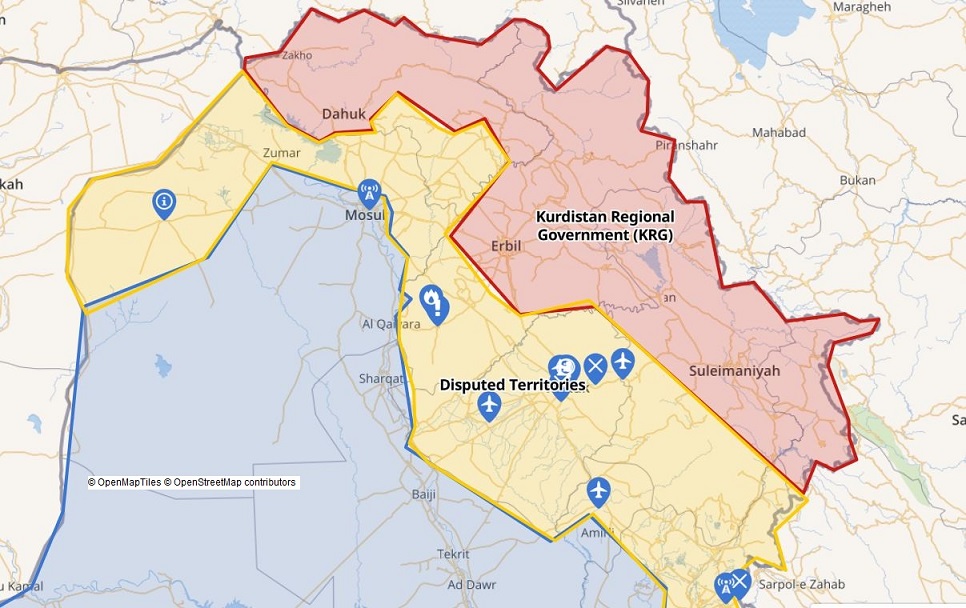2K
Kirkuk
- On Monday, November 22, Iraqi army scouts raided a Kurdish village in Chiman village and demanded land titles from the villagers and farm owners. Following the raid, Kurdish farmers held a protest, but army officials told them the lands were under the names of Arab Sheikhs. The area suffered from Arabization policies and Kurds returned to their lands in 2003, but following the events of October 16, 2017, Kirkuk’s imposed administration restored Arabization policies. In 1987, over 180,000 Kurds were executed in an ethnic cleansing campaign against the Kurds by Saddam Hussein’s regime.
- On Monday, November 22, the Kirkuk Misdemeanors Court sentenced several officials in Kirkuk’s governorate after being charged with corruption. The court issued nine month prison sentences for each, Ali Jabouri, the brother of the acting governor Rakan Jabouri, and three others, including Qassim Ibrahim, head of planning department in the governorate, and two other employees, Khalid Naif Ahmed and Ryad Ahmed. All of the defendants have been nominated to their posts by the imposed/acting governor Rakan Saed, who also faces several corruption cases.
- Over the course of one week, seven anti-government protests were held in Kirkuk against the deterioration of primary services and issues facing locals. The protests included graduate students demanding jobs, store owners protesting against a newly imposed tax, owners of public power generators, and Kurdish citizens in Kurdistan neighborhood demonstrated against the unfair distribution of projects by Kirkuk’s governorate. Additionally, wounded police officers held a rally, demanding residential land from the government similar to active officers.
- On Monday, November 22nd, Kirkuk’s Operation Command announced the discovery of an ISIS (Da’esh) drone during a security search near Ryad subdistrict. According to the statement, the drone was near a farm, and the farmer had fled.
- According to local witnesses, a Turkish spy drone allegedly hovered over the Kurdish district of Qara Hanjeer for 30 minutes on Sunday. Kurdish security officials have been banned from making public statements since the latest Turkish airstrike on the area last month, targeting Kurdistan Workers’ Party (PKK).
- After failing again to win a seat in the parliamentary elections, the Muslim Brotherhood wing Arshad al-Salihi and the current leader of the Turkish-backed Iraqi Turkmen Front, Hassan Turan face pressure from the party to hold a new congress and replace them. Turan was assigned as a new leader of the Turkmen Front in February of 2021; he is considered an ally of Turkey’s authoritarian President Recep Tayyip Erdoğan. The pressure comes from the winner of the only seat for the Turkmen population, Arshad al Salihi, an ultra-right-wing figure backed by Turkish nationalists. Last week, Salihi said Kirkuk is an “inheritance” of the deceased Turkish leader Attaturk, for the Turkmen in Kirkuk, resulting in Kurdish officials responding firmly to the controversial remark.
- Iraq Civil Aviation Authority (ICAA) flew its first plane to “Kirkuk International Airport ” as a test for equipment and runway after the compilation of the airport reconstruction. Though the test was successful, there was no official opening of the airport due to security concerns which prevented international airlines from signing contracts with the airport.
- The National Security’s Kirkuk branch announced the confiscation of two million in counterfeit US dollars in the Mosala neighborhood. The fraud band consisted of three people bringing the counterfeit currency from Turkey. Last May, the Kirkuk police confiscated 16 million counterfeit US dollars.
Khanaqin
- On Sunday, November 21, several Kurdish activists gathered in the “Polish Cemetery” in the town. They appealed to the government of Poland to open up its corridors for the Kurdish asylum seekers stuck on the borders with Belarus. Later the activists held another gathering in front of an old Polish church in Khanaqin. From 1939 to 1942, many Polish servicemen linked with the occupying British military in Khanaqin. The town has a Polish cemetery and Church.
- Iraqi border guards announced the seizure of five smuggled oil tanker trucks attempting to cross the Monthiria border crossing to Iraq. According to the statement, the drivers admitted trying to smuggle the oil to Iran.
Tuz Khurmatu
- Iraqi Air Force using F-16 fighter jets destroyed a Da’esh tunnel near Yangija village west of Tuz Khurmatu. According to a statement by Iraqi security forces, 7 Da’esh terrorists were killed during the airstrike. Further, Saladin Operation Command announced the arrested of three Da’esh terrorists, including a senior leader, during a raid in the Jumaila neighborhood on Tuesday.
Makhmour
- The Joint Peshmerga-Iraqi army operation command announced the seizure of four Katyusha rockets ready to launch on the Makhmour town center. The area remains vulnerable to weekly Da’esh attacks.
- Eight employees of the silo were arrested and accused of the disappearance of 40 tons of wheat worth $51,000. The employees face prison time if charged with theft.
Shingal (Sinjar)
- On Sunday, November 21, a team of the Iraqi Martyrs Foundation exhumated a mass grave consisting of seven people from one family killed by Da’esh during the Yazidi Genocide. The Excavation process is to relocate the corpse of the victims since its location will be developed.
- In a press conference, the governor of Nineveh Najim Jabouri said there are obstacles to establishing a new police force from the Yazidi community. Jabouri said there are “actors” behind hindering the plans of forming the security forces. Baghdad-Erbil security agreement includes the creation of local Yazidi forces in Shingal.

